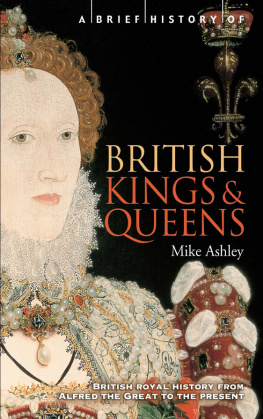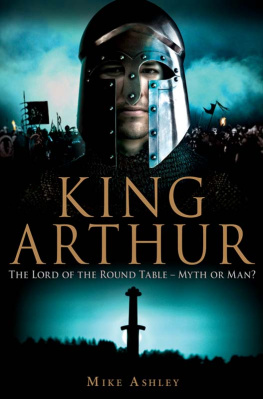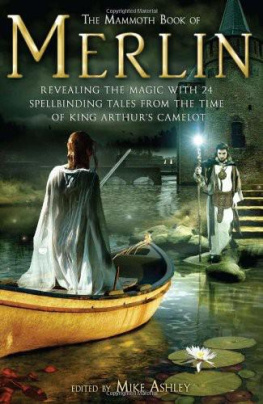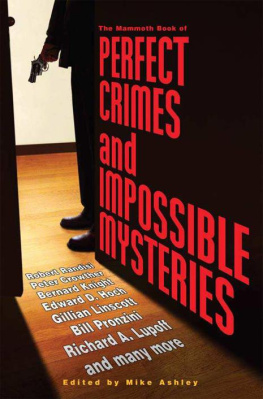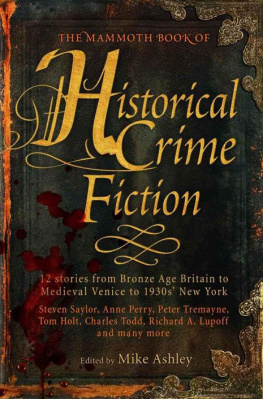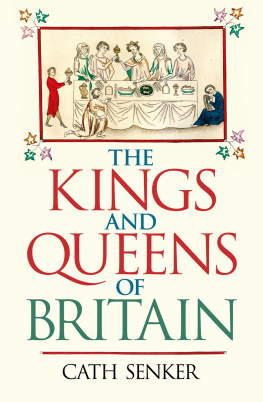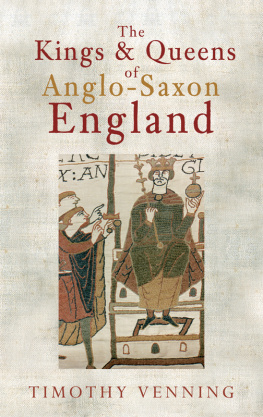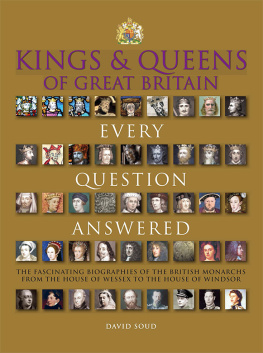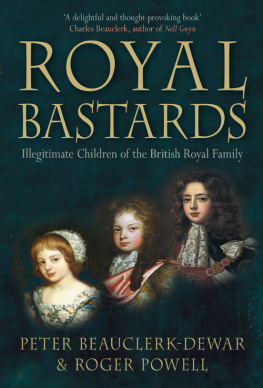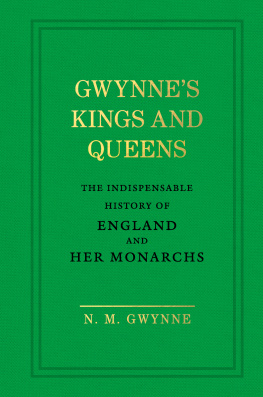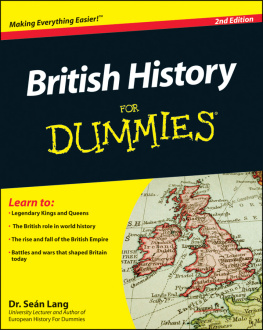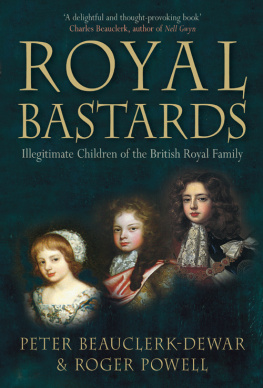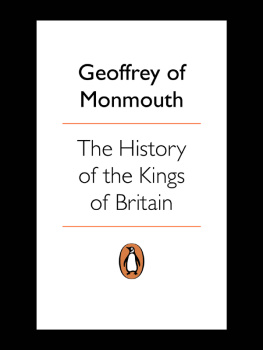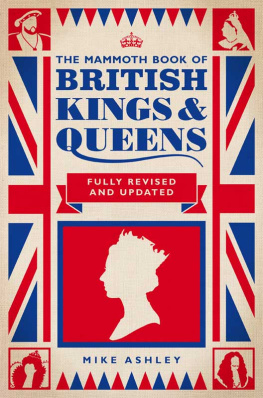MIKE ASHLEY is an author and editor of over sixty books, including many Mammoth titles. He worked for over thirty years in local government but is now a full-time writer and researcher specializing in ancient history, historical fiction and fantasy, crime and science fiction. He lives in Kent with his wife and over 20,000 books.
Praise for British Monarchs
Mike Ashley doesnt skimp on dates in his...hefty 800-page tome on 2,000 years of rule in the British Isles.
Independent on Sunday
... destined to be probably the most complete and authoritative record.
Books Magazine
Other titles in this series
A Brief History of The Boxer Rebellion
Diana Preston
A Brief History of The Druids
Peter Berresford Ellis
A Brief History of Fighting Ships
David Davies
A Brief History of The Great Moghuls
Bamber Gascoigne
A Brief History of The Royal Flying Corps in World War I
Ralph Barker
A Brief History of Science
Thomas Crump
A Brief History of The Tudor Age
Jasper Ridley

Constable & Robinson Ltd.
5556 Russell Square
London WC1B 4HP
www.constablerobinson.com
This book may not be reproduced in whole or in part, in any form or by any means, electronic or mechanical, including photocopying, recording, or by any information storage and retrieval system now known or hereafter invented, without written permission from the publisher.
9 8 7 6 5 4 3 2 1
Digit on the right indicates the number of this printing
Library of Congress Cataloging-in-Publication Data is available on file
eISBN: 978-1-47211-731-1
ISBN-13: 978-0-7867-1104-8
ISBN-10: 0-7867-1104-3
This book may be ordered by mail from the publisher. Please include $2.50 for postage and handling.
But try your bookstore first!
Running Press Book Publishers
2300 Chestnut Street
Philadelphia, PA 19103-4371
Visit us on the web!
www.runningpress.com
Cover design: Simon Levy
CONTENTS
9. The House of Saxe-Coburg-Gotha
(changed to Windsor)
PREFACE
I have long been fascinated by the kings and queens who have ruled these British Isles. I dont mean simply the forty-three from William the Conqueror to our present Elizabeth II, only twelve of whom have ruled a united kingdom, but all of them, almost a thousand, stretching back over two thousand years.
Many of them we know little about, yet they all contributed to the development (not all of it beneficial) of these islands, and many of them interweave in a complex and fascinating way. You can picture it almost like the many tributaries of the mighty river Amazon. Hundreds of these small streams and rivulets starting high up in the Andes and other mountainous regions of South America, filter down, combine and gradually create bigger and bigger rivers until they all flow into the Amazon, the greatest river of them all.
So too the many chieftains and petty tribal kings of England, each of whom ruled their territories, fought with others over theirs, gradually merging some territory, perhaps dividing others, but all steadily coming together over a period of some seventeen hundred years until the United Kingdom emerged in the eighteenth century. The British royal family is one of the oldest in the world. Queen Elizabeth II can trace her ancestry back with certainty for fifteen hundred years and with a degree of accuracy another five hundred. Very few of the worlds remaining royal families can do that.
That has been my fascination. Over the years I have gathered data on all of these rulers and, in 1998, I was at last able to bring this together in my book British Monarchs, subsequently issued in paperback as The Mammoth Book of British Kings & Queens. That was a rather mighty tome all 840 or so tightly printed pages but it achieved what I wanted to do, capturing all the data available on those thousand kings.
However, the picture is so vast and complex that it helps to have a simpler version, one that tells the story from start to finish without too many diversions and backwaters and tributaries. With the considerable help of Elfreda Powell, this Brief History does just that. You will be able to follow through the story of the many rulers of Britain from the earliest times down to the present day and see how the United Kingdom came about and what part each ruler played.
Today the British monarchy has but a symbolic, ceremonial role, whose crucial power is one of restraint. This, of course, was not always so. Our first kings were absolute rulers and warriors. Over the centuries the concept of kingship has changed drastically, often turbulently, as our warring kingdoms evolved, conquered and eventually coalesced.
Fighting and slaughter were not confined to neighbouring tribes and kingdoms, or to kings and their ambitious relatives, but wave after wave of invaders Romans, Saxons, Angles, Danes, Vikings, Normans raided our shores, causing havoc and devastation, until the Normans imposed their strict rule and created order. The main part of this book concentrates on that magnificent procession of strong, weak, benign and bloodthirsty kings and queens whose ambitions, or lack of them, made this kingdom what it is today. The book is also full of charts and lists to help take you through these complex tributaries to the one mighty river of today.
Whether one is a devout royalist or a staunch republican one cannot but be intrigued and fascinated by the process that caused this evolution and by the thousand or so known kings or queens who have ruled part or all of Britain. This book tells that story.
Mike Ashley
Kingdom Against
Kingdom:
Early Britain
PREHISTORY
The islands that form Great Britain have been occupied by humans since the end of the last Ice Age, when a social structure began to emerge that brought with it the need for more powerful and organized leaders. It seems that communities inevitably fall into hierarchies and need a dominant figure to lead, someone whom they can respect and elevate to a higher level almost to one of godhead. We have no record of what these people were like in Britains earliest times, however. Whether they were men who had distinguished themselves through brute strength or cunning, or whether they possessed certain outstanding mystical qualities to become leaders of their nomadic tribes, we do not know. But their role would have been primarily to defend their territory and help their kinsmen to subsist through the changing seasons by hunting and gleaning.
There have been kings and chieftains in Britain for at least 3,000 years. The magnificent tomb discovered at Forteviot in Scotland in 2009 and which dates back to 2000BC was almost certainly for royalty or someone worshipped as a hero. The population of the whole of Britain at that time was about 250,000 rising to perhaps 1.5 million by the time of the Roman conquest. the population of the whole country not exceeding about 20,000. Historians vary on dates but from about the eighth century BC, Celtic culture and probably language from the nearby continent, notably Gaul, began to influence the native British. There was no invasion of the island by the Celts but there was a cultural and social change which brought with it a superior knowledge of iron to make weapons, farm tools and transport.
From about 100BC there was an increased migration of Celts from Gaul into southern Britain which further reinforced the development of a tribal structure with an aristocratic hierarchy. These Celts were highly mobile. They fought with swords and spears and used two-wheeled chariots. These were the Belgae who settled in what is now Kent, the Atrebates in Hampshire and Sussex, and the Parisii in Yorkshire; while other natives tribes, their sworn enemies, were the Trinovantes in Essex, the Iceni in Norfolk, the Dobunni in the Cotswolds, the Dumnonii in Cornwall, the Silures and Ordovices in Wales and the Marches, and the Brigantes of Yorkshire, all independent of one another. In northern Britain (now Scotland) were the Picts.
Next page
